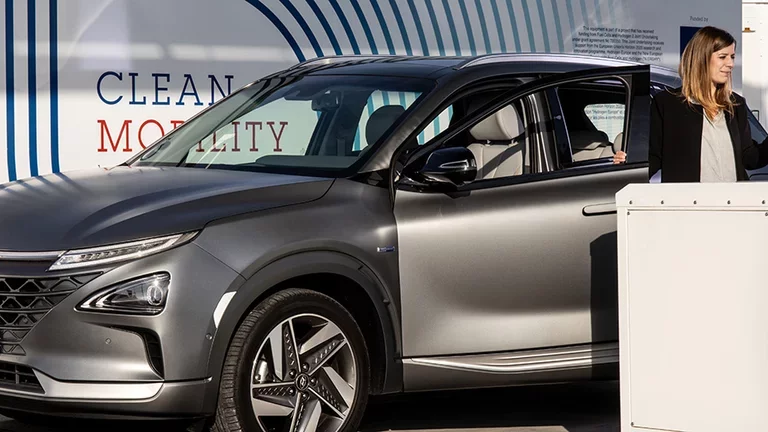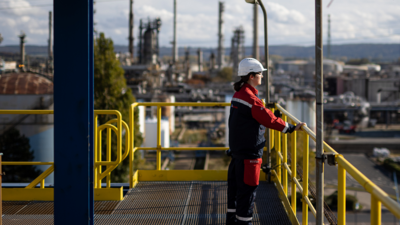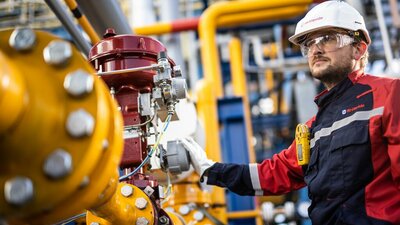Hydrogen Council: coming together to promote hydrogen
Published on September 25, 2020
6 minutes

The Hydrogen Council is the first initiative of its kind in the world. The council is dedicated to showing that hydrogen can provide a key solution for the energy transition. Air Liquide, which is one of the project's founders, explains how the council was first created and its future goals.
Coming together to promote hydrogen, the solution for accelerating the energy transition
It all started at the World Economic Forum in Davos in January 2017. In an effort to help limit global warming to 2 °C in accordance with the target set by the Paris Climate Agreement in 2015, thirteen leaders from the energy, transportation, and manufacturing sectors launched a global initiative to share their vision and goals regarding the use of hydrogen as an accelerator of the energy transition.
The Hydrogen Council was born. It includes Air Liquide, Alstom, Anglo American, BMW Group, Daimler, ENGIE, Honda, Hyundai, Kawasaki, Shell, Linde, Total, and Toyota. These well-known, global companies are involved in the complementary sectors of transportation and energy supply. Through the council, they decided to come together to promote a long-term approach to hydrogen-based uses and technologies and to accelerate their development on a large scale.The well-planned initiative caught on, and new stakeholders quickly came on board. As of mid-2020, three years after it was first created, the Hydrogen Council includes over 90 multinational companies from the automotive, energy, and manufacturing sectors and major stakeholders representing the entire hydrogen value chain. They are all working towards the long-term goal of creating a low-carbon industry based on hydrogen.

“The Hydroden Council works day in and day out to advocate for the use of hydrogen in the global political, economic, and financial ecosystem.
”
Erwin Penfornis
Director of Global Hydrogen Energy Sector at Air Liquide
What is Air Liquide's role on the Hydrogen Council?
Air Liquide, with the active support of Toyota, launched the initiative in mid-2016. The initial goal was to unite the major stakeholders who think hydrogen is a global and trans-industrial solution to the energy challenge at the highest level. We convinced other stakeholders, including Shell and Anglo American, to join the effort, and a “snowball” effect quickly took hold. That is how we were able to make news by bringing together 13 business executives at Davos in January 2017. Ever since, Air Liquide has remained one of the main leaders on the council and works day in and day out to advocate for the use of hydrogen in the global political, economic, and financial ecosystem. By bringing together 13, then 30, and now over 90 different companies, we have been able to make hydrogen more and more visible and credible.
What are your major projects for the future?
What have been some of the Hydrogen Council’s highlight achievements since its founding and what are your personal hopes?
Building a clean and safe energy future
Its goal is to accelerate the large-scale development of innovative, hydrogen-based technologies. Over the past three years, the Hydrogen Council has highlighted the significant benefits this roll-out will provide. In addition to being a versatile, high-potential energy vector, hydrogen does not emit CO2 at the point of end use when it is used as a vector for clean energy. It is now widely recognized as a key part of a clean and safe energy future.
The growing number of roll-outs, strategies, alliances, and technological developments in a broader range of geographical areas and sectors are evidence of hydrogen’s building momentum—as is the growing number of companies who are choosing to join the Hydrogen Council.
Finding funding sources for the "Decade of Hydrogen"
In its latest report, Path to Hydrogen Competitiveness: a cost perspective, the Hydrogen Council showed that the cost of hydrogen-based solutions should drop more quickly and drastically than initially predicted. Within a decade, these solutions will be just as, if not more, competitive than other clean technological solutions in over 20 key applications. However, certain high-potential projects have not yet been implemented due to the lack of a viable economic model. The report estimates that around 70 billion euros are needed to bring hydrogen solutions up to the level of current technologies, i.e. less than 5% of global annual energy spending. This figure could drop to 45 billion euros if a broad base of support is created now. According to the Hydrogen Council, this lack of funds must be addressed through the use of appropriate tools, such as dedicated public-private infrastructure funds. As part of their drive to turn this decade into the “Decade of Hydrogen”, the members of the council are ready to commit significant investments to the cause, but they cannot do it all on their own. They are calling on governments and investors to contribute as well.
CLIMATE CH2AMPION
CLIMATE CH2AMPION is calling for more investment in cleaner hydrogen technologies. This would have a far-reaching effect on people's everyday lives and would lead to better air quality, less pollution and cleaner cities.
The CLIMATE CH2AMPION campaign is a movement to increase awareness on the need for a global energy transition with hydrogen at its core.
Find out more about CLIMATE CH2AMPION on its dedicated website and on Twitter.




